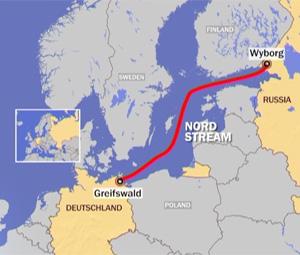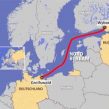
Russia Says It May Abandon Nord Stream Pipeline and Switch to LNG
Publication: Eurasia Daily Monitor Volume: 5 Issue: 222
By:

Russian Prime Minister Vladimir Putin warned on November 12, and Gazprom Vice-President Aleksandr Medvedev echoed on November 18, that Russia might abandon the project to lay a gas pipeline, Nord Stream, on the Baltic seabed to Germany. Instead, Putin and Medvedev asserted, Russia could switch to liquefaction and export the liquefied natural gas (LNG) from Russia’s Baltic shore to world markets (Interfax, November 12, 18).
Hosting Finland’s Prime Minister Matti Vanhanen in Moscow, Putin said: “Europe must decide whether it needs this pipeline or not. If not, we will drop Nord Stream and build liquefaction plants and send the gas to other markets. We will sell it to you [Europeans], too. But it would be more expensive [in liquefied form]” (Kommersant, November 13).
Six days later Medvedev seconded the warning that Russia could opt for seaborne exports by LNG tankers worldwide, if Europeans dragged their feet on Nord Stream. This is the second round of Russian doubt-casting on Nord Stream. In late October the chairman of Russia’s Natural Gas Society (and vice-chairman of the Duma), Valery Yazev, cautioned that project cost overruns and the international financial crisis would delay both Nord Stream and its main designated supply source, the Shtokman gas extraction project in the Barents Sea. Both projects would ultimately be implemented, because they were “important to the whole world” but would cost more and take longer to complete than had been envisaged (BNS citing Helsingin Sanomat, RIA Novosti, Interfax, October 27, 28).
The Nord Stream consortium includes Gazprom with 51 percent of the shares, Germany’s E.ON Ruhrgas and BASF/Wintershall with 20 percent each, and Nederlandse Gasunie with 9 percent. The Nord Stream board had announced as recently as mid-October that the first stage of the pipeline would go into operation in 2011 (deferred from 2010, however), with the second stage expected by 2012, for a combined annual capacity of 55 billion cubic meters of gas. Also in October, President Dmitry Medvedev and Chancellor Angela Merkel reaffirmed strong political support for Nord Stream during the Russian-German annual intergovernmental meeting in St. Petersburg. Publicly at least, there was no threat of Russian abandonment of the project.
Evidently surprised and apparently stung by the Russian officials’ latest remarks, some European managers with the consortium are downplaying the situation. They maintain that the pipeline’s first stage can still be commissioned on the revised schedule by 2011 and that the project’s importance should ensure borrowing on financial markets despite the credit crisis, albeit at a higher cost (Reuters, October 29, November 17; Financial Times, November 18). All this almost certainly spells further delays.
The Russian officials’ unprecedented statements reveal a loss of confidence in the viability of Nord Stream and, indirectly, reflect the larger problems confronting Russia’s gas sector. Those issues impinge on Germany due to its overdependence on Russian gas. Germany’s total consumption amounts to more than 90 billion cubic meters annually, more than40 percent of which comes from Russia. Some of Germany’s most influential business interests as well as the government have made a strategic decision to rely on Russian gas, in contrast to the European Union’s strategy—and the actual situation of most countries in the “old” EU—of ensuring a diversity of suppliers.
The German government’s latest report on energy security, released on November 5, maintains that the Nord Stream project is “indispensable, in order to secure growing volumes of [Russian] gas in the future too.” The report claims that Nord Stream would not replace any existing transit routes and does not compete with other planned pipelines. These claims are not entirely accurate. Nord Stream is, in fact, intended by Gazprom to redirect some of the gas export volumes that have traditionally been handled by the Polish and Ukrainian transit pipeline systems. Moreover, insofar as Gazprom plans to rely increasingly on Central Asian gas to sustain its exports to Europe, the Nord Stream project competes indirectly and possibly even directly with the Western-supported Nabucco project for Caspian gas.
Anticipating strong growth in the German demand for gas, the government’s report extols the clean-fuel qualities of natural gas but also admits that it “entails a steadily growing import dependency and price risks” (Frankfurter Allgemeine Zeitung, November 5).
The single most important factor behind the gas demand growth in Germany, however, is the political decision to reduce reliance on nuclear power and eventually abandon it altogether. The former Social Democrat-Green government forced that decision on Germany and adheres to it rigidly in the current coalition government, despite growing objections by the Christian Democrat/Christian Social Union.




